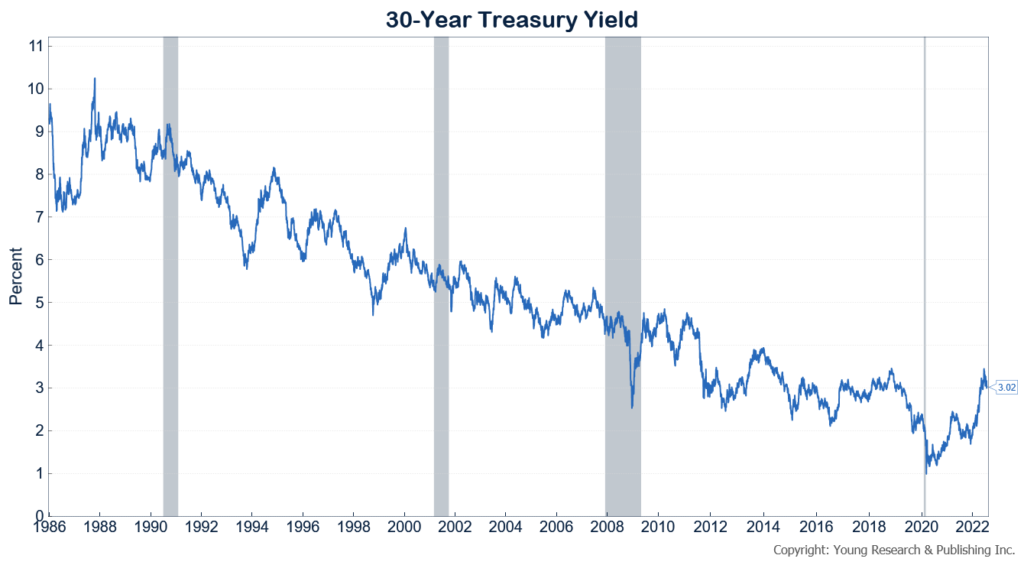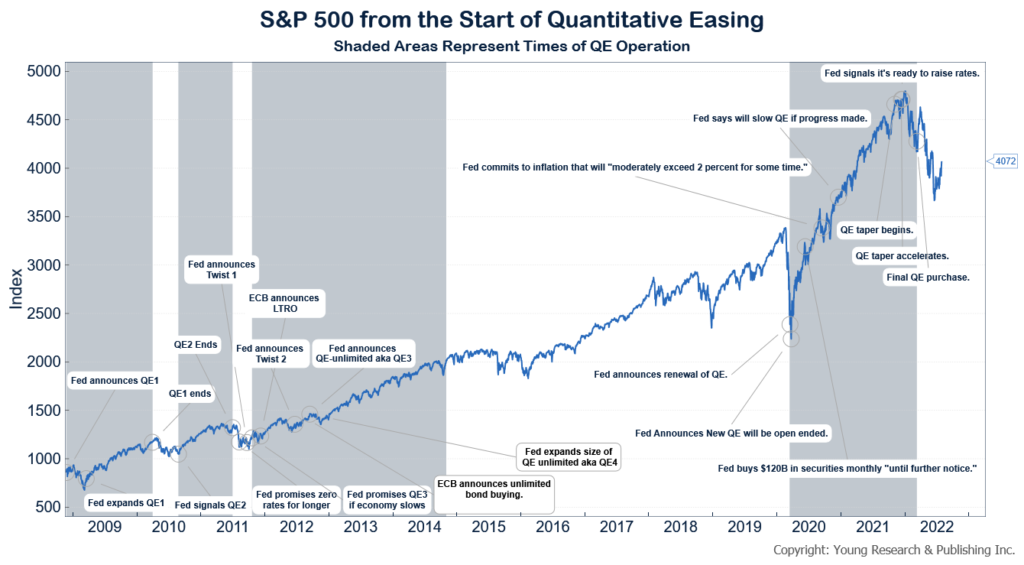UPDATE July 29, 2022: Is America going into a recession? After two-quarters of declines in GDP, it has that look. The NBER makes the final decision on what is and what isn’t a recession, but those designations are often made well into a recession or even after it’s over in some cases. Practically speaking, Americans are looking at an economic slowdown that they will have to adjust to, no matter what it’s called. Preparing your investment portfolio for slower growth is not always easy. If you need help, I would love to talk with you about building a plan like the one I described here. If you want to talk, contact me here.
UPDATE April 2, 2021: In my conversations with you, you continue to tell me how much you miss Richard C. Young’s Intelligence Report. Dick’s monthly letter was like a trusted family member you looked forward to hearing from because you knew you’d hear the unvarnished truth. Dick wrote recently that the four most important words in investing are:
- COMPOUNDING
- INTEREST
- DIVIDENDS
- DURATION
Dick then cited Fidelity Learning Center’s explanation of duration:
While no one can predict the future direction of interest rates, examining the “duration” of each bond, bond fund, or bond ETF you own provides a good estimate of how sensitive your fixed income holdings are to a potential change in interest rates. Investment professionals rely on duration because it rolls up several bond characteristics (such as maturity date, coupon payments, etc.) into a single number that gives a good indication of how sensitive a bond’s price is to interest rate changes. For example, if rates were to rise 1%, a bond or bond fund with a 5-year average duration would likely lose approximately 5% of its value.
UPDATE: It’s been two years now since the last issue of Richard C. Young’s Intelligence Report, and the more things change, the more they stay the same. The Fed just announced it will begin buying $60 billion a month in T-bills. And the cycle continues.
Originally published August 30, 2017.
“I’m going to miss hearing from Dick Young every month,” said one long-time reader of Intelligence Report, “I’ve been reading his letter for 25 years. He was the best hands-down. He always wrote to me the way he saw things.” That’s a common refrain I’ve been hearing over the last couple of weeks. In an industry littered with opinions, you could always depend on the integrity of Dick Young and Intelligence Report.
Since 1998, when I first started working with Dick and Matt Young, prospective clients have been saying: They trust Mr. Young, they’ve followed his advice for years, and now that they’re older they can’t afford to make a mistake.
That’s a powerful emotion when it comes to investing: You can’t afford to make a mistake.
It’s an emotional time when you stop earning money and have more than you’ve ever had in your life.
But keeping too much of your hard earned money “safe” means you and your money are in retirement mode. You can’t afford that either. It’s a brutal task managing money today, thanks to the low interest rate environment that has inflated stock prices. Or, I should say, it’s a brutal task to realize that future returns are likely to be well below expectations.
You need to have an “expectation reality check,” because things are moving fast. What do you invest in when high stock prices make you queasy and yet stocks are used as currency? Take a look at yesterday’s news, for example: United Technologies Corp. in talks to buy Rockwell Collings, Inc.
Today, the big fish are gobbling up the smaller one’s and who’s complaining? Not Rockwell’s shareholders. The stock closed at $130, up 155% from a year ago.
The environment we’re dealing with today has been manufactured. Not by workers in the mid-west busy building the things America needs, but by the so-called geniuses at the Fed. They’ve engineered low interest rates that have helped boost real estate valuations for some, especially private equity investors, but has also ignited the stock market.
Low interest rates have been the invisible tax (actually quite visible on monthly statements). And adding insult to injury, the Fed buying up bonds for its own balance sheet has left income investors searching for yield in far away places rather than the historical safe harbor of full-faith Treasuries.
Look at the charts and see the connection between the Fed’s reckless policies and what it has done to stocks. It’s truly criminal the way the savers of this country have been kicked to the side of the road in favor of Wall Street.
That’s today’s reality. If you can’t afford to make a mistake (can anyone really?), then you need to take a hard look at how you’re invested. I’d be happy to talk with you. The lessons we all have learned in Intelligence Report are never going away. You can email me anytime at ejsmith@youngresearch.com. I look forward to hearing from you.
Originally published August 30, 2017.
E.J. Smith - Your Survival Guy
Latest posts by E.J. Smith - Your Survival Guy (see all)
- Breaking: New Rules on Trillions in IRAs and 401(k)s - April 24, 2024
- When You’re in Control, You Have Opportunities - April 24, 2024
- Newport, Rhode Island: Sailing, Mansions, and High Taxes - April 24, 2024
- Yes, Money Can Buy You Happiness - April 23, 2024
- State Income Taxes and the 2024 NFL Draft Class - April 23, 2024

















